Transgender people often face discrimination, oppression, and stigmatization that cisgender individuals never have to experience. Transgender is a gender identity term that refers to a person who does not identify as the sex that a doctor assigned them to at birth. This term also includes people who are nonbinary, genderfluid, genderqueer, as well as individuals with no gender or multiple genders. Because of the discrimination that they face at the hands of personal and systemic transphobia, trans individuals face higher rates of mental health complications than cisgender people.
Unfortunately, the discrimination trans individuals experience tends to trickle over into the medical care industry. Because of this, they may not receive the proper mental health treatment they need. This leads to higher rates of addiction as transgender individuals begin to self-medicate.
Frequent Discrimination Leading to Decreased Mental Health
Individuals who identify as transgender often struggle with frequent discrimination. This discrimination occurs in a variety of places, including general society, within the family, and in religious spaces. Constantly dealing with discrimination may cause individuals to experience internalized transphobia as well. As a result, many transgender people develop mental health conditions that often lead to self-medication and addiction.
Society
Societal discrimination against transgender people makes it extremely hard for these individuals to feel comfortable in the outside world. This is often referred to as “minority stress,” which is the idea that health issues among minority groups are caused by the larger and more dominant culture in their society. For example, minority stress could apply to anyone belonging to a minority group that experiences racism, homophobia, transphobia, sexism, or any other form of discrimination.
Transgender people tend to experience societal discrimination daily. Whether they are being called slurs on a public bus, being denied healthcare due to their gender identity, or even being violently attacked at random, this form of gender minority stress causes an array of mental health issues including PTSD, depression, anxiety, and addiction.[1]
Family
Familial discrimination is something that occurs frequently for individuals who belong to the LGBTQ+ community. Unfortunately, many individuals who identify as gay, lesbian, bisexual, transgender, or any other minority experience discrimination within their own families. Oftentimes, transgender teens are disowned by their families and kicked out of the home solely because of their gender identity. This leads to an array of issues such as homelessness, PTSD, addiction, and even suicide.
Religion
Religion is prevalent in America. While religion can be an extremely uplifting and positive part of an individual’s life, many members of the LGBTQ+ community are shamed out of religious spaces due to their sexual and gender identities.
When a group of people judges an individual based on aspects of their existence that are out of their control, it is common to experience extreme feelings of shame, guilt, and worthlessness. Some trans people may begin to hide their gender identity out of fear of religious persecution. Because of this, many transgender people who are a part of a religious community experience high levels of depression, anxiety, religious trauma, internalized transphobia, PTSD, and addiction.[2]
Barriers to Addiction Treatment for Transgender Individuals
Transgender individuals and other members of the LGBTQ+ community continue to face discrimination in the healthcare setting. Unfortunately, this is true among many residential addiction treatment programs across the United States.
The National Institutes of Health shared a study that examined stigma and transphobia within treatment centers. They found that some participants did experience transphobia, stigma, and violence within the treatment facilities, causing them to leave rehab prematurely to avoid further conflict.[3]
Additionally, a large number of healthcare providers have little experience treating transgender people.[4] This leads to an inability to provide treatment or support for transgender-specific needs, such as treating the effects of transphobia, providing healthcare for transitioning individuals, and much more.
The Addiction Treatment Needs of Transgender People
Because of the unique challenges that transgender people face, they require an array of individualized services during addiction treatment.
The trauma that a transgender person experiences is often different than that of a cisgender individual. As a result, an addiction treatment center must be equipped to provide transgender individuals with proper and effective treatment for transphobia and discrimination.
Important aspects of addiction treatment for transgender individuals include:
- Therapy for gender dysphoria including the availability of hormone treatment
- An LGBTQ+ friendly environment with informed staff members
- Co-occurring disorder treatment options
- Therapy for the effects of gender minority stress
- Therapy for individuals who were closeted or disowned by their families or religious communities
- Evidence-based treatments for transgender-specific issues
Transgender individuals frequently experience higher rates of mental illness and addiction than cisgender people. Because of this, treatment centers need to be informed on and equipped to treat the unique challenges that members of the LGBTQ+ community face.
Thankfully, there are several LGBTQ+ friendly addiction treatment centers, like Mandala Healing Center. For more information on how we meet the needs of transgender people and the LGBTQ+ population while providing effective addiction treatment, contact us today.
References:












